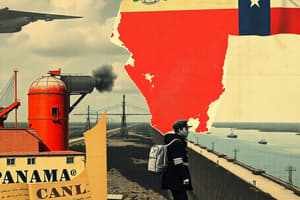Podcast
Questions and Answers
The Spanish-American War in 1898 involved the U.S. supporting which country's fight for independence?
The Spanish-American War in 1898 involved the U.S. supporting which country's fight for independence?
- Cuba (correct)
- Puerto Rico
- Mexico
- Philippines
Yellow Journalism aims to report unbiased news.
Yellow Journalism aims to report unbiased news.
False (B)
When did the Panama Canal open?
When did the Panama Canal open?
1915
What was the main target of the Boxer Rebellion in 1900?
What was the main target of the Boxer Rebellion in 1900?
Define Imperialism
Define Imperialism
What territories did the US annex as a result of the Spanish-American War?
What territories did the US annex as a result of the Spanish-American War?
What did the Roosevelt Corollary state?
What did the Roosevelt Corollary state?
The Monroe Doctrine declared that Europe could interfere in the affairs of the Western Hemisphere.
The Monroe Doctrine declared that Europe could interfere in the affairs of the Western Hemisphere.
What is 'Seward's Folly'?
What is 'Seward's Folly'?
What is meant by 'Spheres of Influence in China'?
What is meant by 'Spheres of Influence in China'?
Name one thing Theodore Roosevelt is known for.
Name one thing Theodore Roosevelt is known for.
What did the Open Door Policy propose?
What did the Open Door Policy propose?
Which of the following was a cause of the Spanish-American War?
Which of the following was a cause of the Spanish-American War?
Who was Queen Liliuokalani?
Who was Queen Liliuokalani?
As a result of the Spanish-American War, the US gained control of: Puerto ______, Guam, and the Philippines
As a result of the Spanish-American War, the US gained control of: Puerto ______, Guam, and the Philippines
Flashcards
Spanish-American War
Spanish-American War
Conflict in 1898 between the U.S. and Spain, supporting Cuban independence.
Yellow Journalism
Yellow Journalism
Exaggerated or distorted news reporting to sensationalize events and attract readers.
Panama Canal
Panama Canal
A vital waterway connecting the Atlantic and Pacific Oceans through Panama.
Boxer Rebellion (1900)
Boxer Rebellion (1900)
Signup and view all the flashcards
Imperialism
Imperialism
Signup and view all the flashcards
Spanish-American War (1898)
Spanish-American War (1898)
Signup and view all the flashcards
Roosevelt Corollary
Roosevelt Corollary
Signup and view all the flashcards
Monroe Doctrine
Monroe Doctrine
Signup and view all the flashcards
Seward's Folly
Seward's Folly
Signup and view all the flashcards
Spheres of Influence in China
Spheres of Influence in China
Signup and view all the flashcards
Theodore Roosevelt
Theodore Roosevelt
Signup and view all the flashcards
Open Door Policy
Open Door Policy
Signup and view all the flashcards
Spanish American War Causes
Spanish American War Causes
Signup and view all the flashcards
Queen Liliuokalani
Queen Liliuokalani
Signup and view all the flashcards
As a result of the Spanish-American War, the US gained control of
As a result of the Spanish-American War, the US gained control of
Signup and view all the flashcards
Study Notes
- These are study notes on US Expansion and Imperialism
Spanish-American War
- A war in 1898 between the United States and Spain.
- The U.S. backed Cuban independence.
- Fought in Cuba and the Philippines.
- The U.S. intervened ostensibly for Cuba and the Philippines, with an actual goal to establish itself in the Pacific.
- Lasted less than three months.
- Resulted in Cuba's independence.
- The US annexed Puerto Rico, Guam, and the Philippines.
- Contributing factors included American support for Cuban and Filipino independence movements.
- The explosion of the U.S.S. Maine in Havana Harbor further fueled the conflict.
Yellow Journalism
- Describes journalism that sensationalizes or distorts news.
- It aims to create excitement and attract readers.
Panama Canal
- A ship canal across the Isthmus of Panama.
- Built by the United States.
- Opened in 1915.
Boxer Rebellion (1900)
- An uprising in China against foreign influence.
- Suppressed by an international force of approximately 18,000 soldiers, including Americans.
- Paved the way for the 1911 Chinese Revolution.
- Led to the establishment of the Republic of China in 1912.
Imperialism
- A policy of extending a nation's power and influence.
- Achieved through diplomacy or military force.
Roosevelt Corollary
- An addition to the Monroe Doctrine articulated by Roosevelt in 1904.
- Asserted the U.S. right to protect its economic interests in South and Central America through military force.
Monroe Doctrine
- Declared in 1823 that Europe should not interfere in the Western Hemisphere.
- European interference would be viewed as a threat to the U.S.
- Stated that Europe could not re-colonize newly independent New World colonies.
- Primarily a show of nationalism with limited impact until later in the 1800s.
Seward's Folly
- Refers to Secretary of State William Seward's purchase of Alaska from Russia in 1867.
- The purchase was initially considered a mistake.
- Later seen as a great bargain, similar to the Louisiana Purchase.
Spheres of Influence in China
- China was divided by European powers.
- Each country had special authority over certain regions.
- The European countries supported each other in these spheres for economic advantages.
Theodore Roosevelt
- 26th President of the United States.
- Known for conservationism and trust-busting.
- Signed the Hepburn Act and promoted safe food regulations.
- Advocated for the "Square Deal."
- Oversaw the construction of the Panama Canal.
- Initiated the Great White Fleet.
- Awarded the Nobel Peace Prize for negotiating peace in the Russo-Japanese War.
Open Door Policy
- Proposed by the U.S. in 1899.
- All nations would have equal trade opportunities in China.
Queen Liliuokalani
- The Hawaiian queen overthrown by American business interests.
Studying That Suits You
Use AI to generate personalized quizzes and flashcards to suit your learning preferences.




